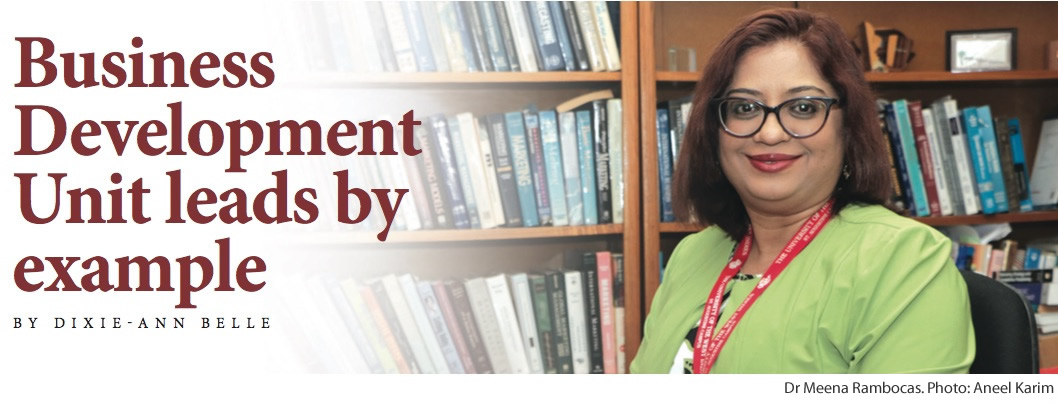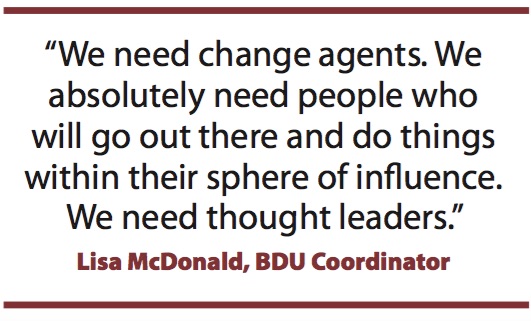
At a time when many administrations are contemplating their prospects with apprehension, the staff of the Business Development Unit (BDU) of the Faculty of Social Sciences has their sights fixed on a future full of potential and growth.
The Unit provides educational and professional services within the disciplines of the social sciences to the business community, civil society, public servants, and students.
“The vision is that the BDU becomes a self-sustaining entity within the Faculty, within the university,” explains Dr Acolla Lewis-Cameron, Dean, Faculty of Social Sciences and Head of the BDU. Her research and consultancy in tourism education, planning and policy, as well as marketing, are instrumental in her position.
Over the last 10 years, the Unit has been working towards its goal, starting with a successful summer school. Some of the services offered include programmes for CAPE students looking to get a head start on university, and courses for UWI and non-UWI students who want to accelerate their programmes. Recently the BDU has expanded its purview. “In 2019, the Faculty agreed on a vision for Social Sciences going forward which is to be socially engaged and solutions-oriented and, in building on that vision, we have restructured the way that the Faculty works in terms of our internal operations,” explains Dr Lewis-Cameron.
Dr Meena Rambocas, Deputy Dean, Planning and Programming, at the Faculty of Social Sciences also brings her expertise in marketing to the team. Commenting on their new options, she notes, “It is a means of capitalising on the vast experience that our staff members possess. Our staff members have a wealth of experience, a wealth of cutting-edge research that has been produced, and it’s a means of sharing this with the general stakeholders, to engage stakeholders, and to really promote the practice of business in the Caribbean and the wider sphere.”
This expansion involves promoting their consultancy services. They work with private and public sector stakeholders to assess their needs and then develop customised programmes to match their goals. The unit is also exploring an innovative initiative of “stackable credits”, an option for people looking to upgrade their skills and acquire certification.

Presently the staff is excited about a new programme launching in September. “Another arm of the Unit is creating multiple learning pathways for persons interested in furthering their education or looking for certification,” says Dr Lewis-Cameron. “We have been offering the Strategic Leadership and Management Master’s, which we have restructured, and it’s now the Strategic Leadership and Innovation programme.”
Expanding on their next steps, Lisa Mc Donald, Business Development Unit Coordinator, talks about the professional development seminars they are planning. “We’re looking at customised training. We’re looking at different learning pathways. So in other words, in one semester, we launched the BDU under these new parameters and created a strategic plan.”
She notes the potential implications of their services on society. “We need change agents,” she affirms. “We absolutely need people who will go out there and do things within their sphere of influence. We need thought leaders.”
The BDU team takes their own roles as change agents seriously. When the pandemic struck, they made the necessary alterations to be safe, adapted and pushed on. All their recent courses have been offered online. Through the work of Support Technician Sophia Persad, they are one of the few faculties with a live chat for site visitors.
They also began to investigate the issues of their stakeholders in the current unique and challenging climate. “There was a need to deal with the softer side of the consequences of COVID, and to deal with the mental turmoil that may exist in individuals in an organisation,” says Dr Rambocas. The result was a well-received virtual seminar tailored to help managers to reflect and evolve their leadership strategy in a post-COVID-19 era.

As they continue to engineer their evolution, the team is eager to expand their reach. Dr Lewis-Cameron envisions, “When we look down the road we are looking at a space where stakeholders can come to for guidance, for training, for advice, for counsel on all things pertaining to learning solutions.”
They are also invested in their role in the advancement of the university and the country at large. “We are part of the UWI brand,” emphasises Dr Rambocas. “That means something to the quality and standards that we offer.” She adds, “We are mindful of the changing demand, mindful of the needs of the market, but we are also mindful of our strength, and we think that our strength can promote the needs of society, the needs of Trinidad, particularly diversification needs at this point in time.”